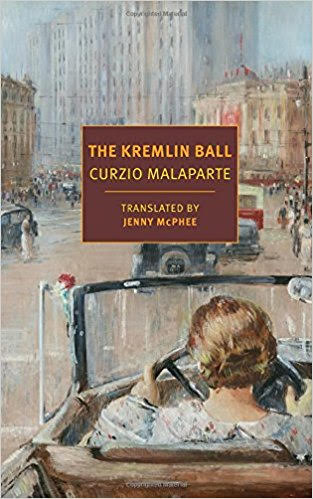"The Kremlin Ball" by Curzio Malaparte

Above: "The Kremlin Ball." Curzio Malaparte. 211 Pages.
Malaparte's writing on the early Soviet "aristocracy" is informative, insightful, and redolent of universal truth - "Power corrupts."
I completed reading this novel today.
The translation of this unfinished novel written in Italian results in stunningly beautiful, intricately descriptive, English prose. Reading the English version of "The Kremlin Ball," almost makes you want to learn Italian so as to fully appreciate the first hand descriptions of Bolshevik decadence and debauchery at the end of the first ten years of Communist rule in Russia.
The excellent writing, with descriptive depth and carrying the insight of a sharp observer, doesn't let up. Put on a blindfold, point to a random paragraph...guaranteed that the indicated paragraph can be read in isolation and appreciated for its own intrinsic worth...substance AND writing style.
Here's a quote from the book which serves as a "headline" for the novel's narrative:
"They ["communist nobility"] had very suddenly risen up to sleep in the beds of the great women of the czarist nobility, to sit in the gilded chairs of the czarist officials, carrying out the same functions that until the day before had been carried out by the czarist nobility. Every one of those Red nobles studied how to imitate Western behaviors: the women studied Parisian styles, the men studied London customs, and to a lesser extent those of Berlin or New York. The most elegant women were actresses; the most elegant men were officers, especially the officers of the cavalry of the Proletarsky Division stationed in Moscow, along with a few of the diplomats from Narkomindel, the People's Commisariat for Foreign Affairs."
Malaparte, in "The Kremlin Ball," inserts himself as a fictional diplomat into Soviet society to record anecdotes about and encounters with from real players in the Soviet 1920's "aristocracy." In a way, his most resonant character is Lenin... six years dead, to be sure, but where every so often German specialists appear to "empty, scrape out, and disinfect the shell of that precious crustacean, that sacred mummy, the porcelain white face lit up by red freckles veiled by a greenish mold-like sweat." Malaparte indicates, in so many words, that practically from the start, like Lenin's decaying corpse, communism was rotting, dying, if not dead already, its practitioners the living dead.
Most have never heard of Malaparte. This is likely because, at least for a while, he was Mussolini's buddy and he once hung out with Heinrich Himmler. For most of his life,Malaparte professed atheism. But, by the end of his life in Rome in the mid 1950's, he was a committed Communist AND Catholic (!).
Malaparte's writing on the early Soviet "aristocracy" is informative, insightful, and redolent of universal truth - "Power corrupts. Absolute power corrupts absolutely."
"The Kremlin Ball's" account of Soviet decadence reminds that no government structure is immune from corruption and from becoming tyrannical if it is allowed to gain too much power.